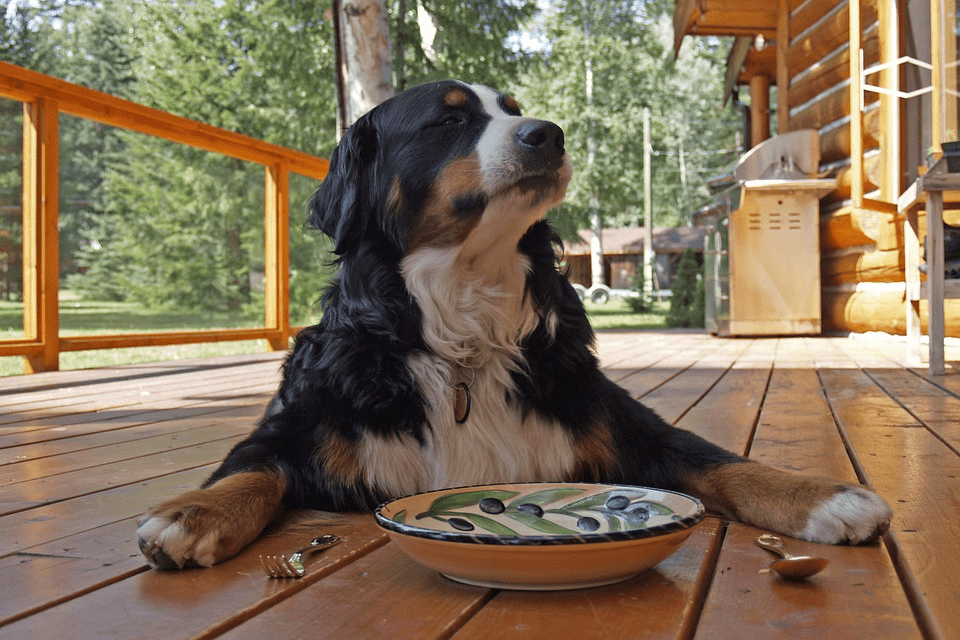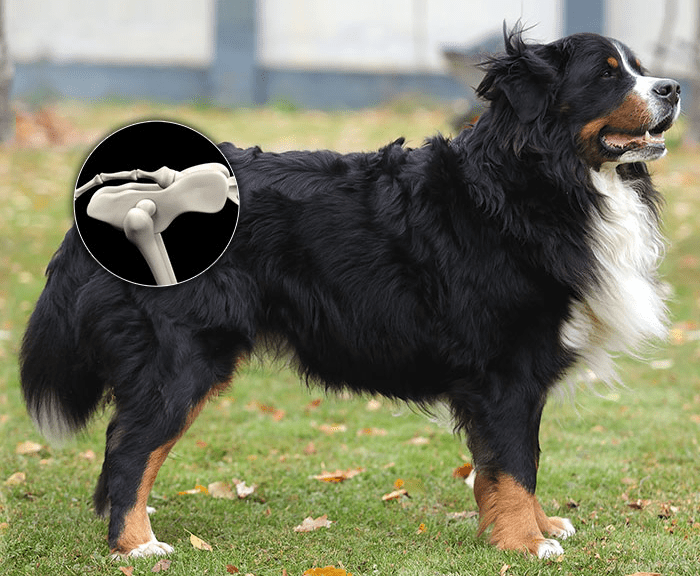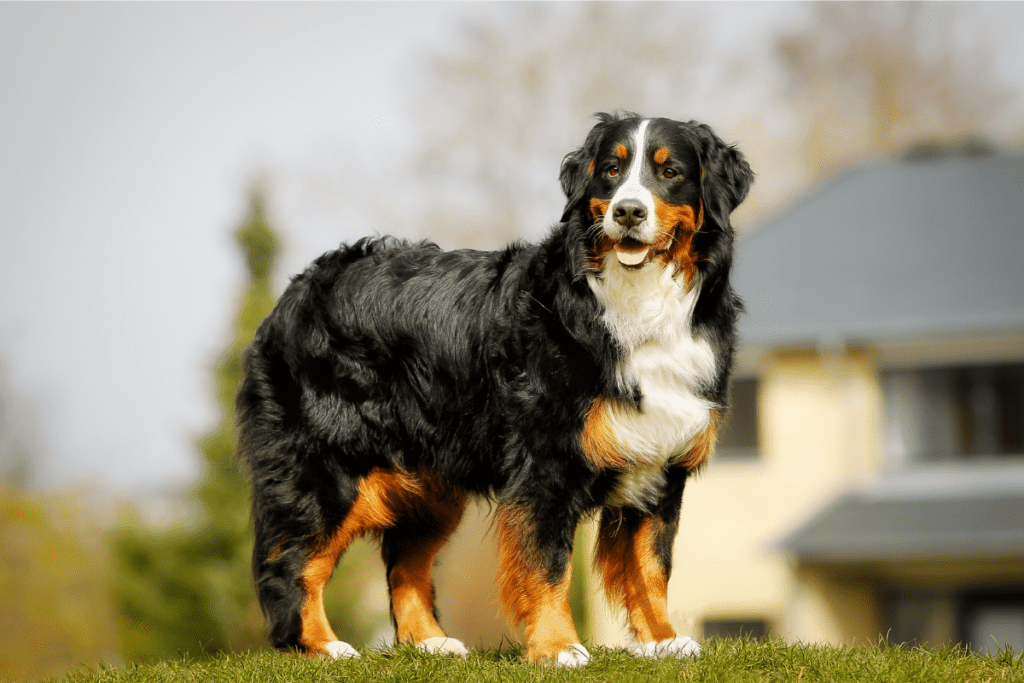Bernese Mountain Dogs are one of the most beautiful creatures of nature. They’re fluffy and gorgeous, and they make lovely family pets. These dogs were first imported to the United States in the 1920s and have become quite popular.
However, the major disadvantage of owning these furry giants is that you only have their company for 6 to 8 years (approx). Bernese Mountain dogs are among the top ten breeds with the shortest lifespan.
Nonetheless, as dog owners, our goal is to spend as much time as possible with our canine companions and enhance their quality of life. So, with this note, we have dedicated this post to analyzing the factors that reduce the life expectancy of Bernese Mountain Dogs and what can be done to increase it.
This would be an educational blog, and we do not intend to prescribe any medical advice.
Bernese Mountain Dogs

Bernese Mountain Dogs are extremely versatile, belonging to the working group (AKC). These dogs are hard workers who are normally calm, but they are always up for a play session with their owner, whom they live with and are eager to please.
Standing over 27 inches at the shoulder and weighing between 70 and 115 pounds, Bernese is a large breed dog known for its strikingly fluffy and moderately- long tri-colored coat. Berners are a sturdy breed that thrives in cold conditions. They get along with everyone in the family and are especially patient with toddlers. Berners are formidable but not intimidating and can easily be kept in a homely ambiance.
Despite so many good characteristics, the drawback of keeping Berners is their short life expectancy. You cannot expect them to live beyond ten years (maximum). In addition, the breed’s tiny gene pool is often considered responsible for numerous health problems, and the practice of inbreeding further aggravates this issue.
As a result, people adopting a Bernese Mountain Dog should use extreme caution to avoid supporting harmful breeding methods. It’s, therefore, advisable to adopt Berners from shelters instead of buying them.
Breed Characteristics
| Weight | 70- 115lbs |
| Height | Up to 27 inches |
| Lifespan | 7- 10 years |
| Personality | Easy to train, energetic, lovey-dovey, affectionate, playful, and social |
| Shedding | High |
| Drooling | Medium to High |
| Physical Needs | Medium to High |
7 Ways to Increase Life Expectancy of Bernese Mountain Dogs
Bernese Mountain Dogs live for 6 to 8 years on average. As previously noted, the high mortality rate in these dogs is due to several types of canine malignancies. Furthermore, this breed, particularly purebreds, is prone to serious health problems due to their enormous size.
As a result, breeders are attempting to reduce the number of Berners bred with health issues or other potential factors. And we’ve mentioned a list of things that dog owners can do to improve the quality of life for their Berners and ensure that they live a few days or months extra.
Additionally, these recommendations will assist dog owners in learning how to keep a healthy lifestyle for their giant pets. Even though this is unlikely to extend your dog’s life to a great extent, it may give a better idea of what may come ahead.
#1. Choose the pedigree wisely
As previously stated, these dogs have several inherited health concerns, including hip and elbow dysplasia. As a result, it is always a good idea to check your Berner’s genealogy and see whether its parents have a history of any health problems. And if you come across one, it’s best to go with a different bloodline dog.
In this context, it is also worth checking the breeder’s status from whom you are getting your dog. Finding a breeder with a history of Bernese Mountain dogs that live longer than the average of 8 years is the best option. In addition, ask the breeder if the dog has undergone health checkups like hip and elbow evaluation, cardiac examination, Von Willebrand’s Disease DNA Test, etc.
#2. Regular checkups

After you get your dog, keeping it under regular vet checkups is of utmost importance. Even if your fur baby looks fine outwardly, take it for medical examinations at least once every 2-3 months. Vaccinating it annually is also something that should never be skipped.
Always remember that many medical issues are easier to handle if identified early. In addition, depending on the pathogens prevalent in your area, you should administer regular deworming medicines to your Berner.
#3. Regular exercises
Berners are one of the giant dog breeds globally, and it tends to gain extra weight and become obese. Hence, maintaining a regular exercise and outdoor activity schedule can become handy in ensuring the good health status of your dog.
Give your Bernese toys to engage with, and take them on long daily walks for at least 30- 40 minutes. Allowing these dogs to walk, run, and play in the open air can help them stay emotionally stimulated and physically active. That being stated, restrain your dog from exercising one hour before or after a full meal.
Additionally, please wait until the Berners puppy is at least two years old before allowing them to run and play on hard surfaces, leap excessively, or pull big objects. Doing so may harm their bone structure and joints, resulting in problems later in life.
#4. Spaying

In the United States, spaying or neutering dogs is a widespread practice.
According to science, spaying female canines help avoid uterine infections and breast malignancies. In the case of Bernese Mountain Dogs, spaying has been found to improve life expectancy. According to studies, the optimal time to neuter a male Berner is after two years. On the other hand, female dogs do not have a fixed time. However, it is always a good idea to see your veterinarian before spaying or neutering your dog.
#5. Genetic testing
Genetic testing is usually required if you’re thinking about buying a purebred dog.
As previously stated, purebred Berners are prone to developing health problems such as cataracts, epilepsy, and dysplasia, among others. And getting specific tests is the only way to stay abreast of these health problems or know how prone your dog is to them.
Always remember that early detection of sickness is crucial. We say so because prevention is always better than cure when it comes to improving the life expectancy of your Bernese Mountain Dog.
#6. Proper diet

This is a crucial aspect that you must not avoid. Since Bernese Mountain Dogs belong to the giant breed, you should always feed the diet for large dogs. While feeding these dogs, remember that Berners tend to gain weight fast and become obese. As a result, adjust your Berner’s food intake based on its level of exercise, age, and weight.
Also, avoid giving your dog all of the food at once. Instead, please provide your dog with small food quantities throughout the day. You may cook dog food at home to ensure that your dog gets all of the vitamins and minerals it needs. However, keep in mind that cheap dog diets may contain many fillers and artificial chemicals, which should be avoided at any cost.
#7. Be aware of the Berners diseases
Before choosing your Berners puppy, make sure to have a clear understanding of the potential diseases it may have. We have already listed those health issues above, which you can refer to. This knowledge is crucial as it will help you make an informed decision and prepare you for what may come in the future. The majority of these problems can be avoided by going to the veterinarian regularly.
The Life Expectancy of Bernese Mountain Dog

The American Kennel Club estimates a lifespan of 7-10 years for the Bernese Mountain Dog, and other sources estimate 6 to 8 years. According to a Swiss study, Berners in Switzerland have an average longevity of 8.5 years (on average), whereas a Danish study shows this to be somewhere around 7.1 years.
Regardless of these surveys, it is a reality that this breed has a shorter life expectancy than most other dog breeds. Larger breeds of dogs have a shorter life expectancy, and Berners, however, have the shortest lifespan of any dog breed.
Why are Bernese Mountain Dogs so Short-lived?

It is worth focusing on the potential reasons that reduce the lifespan of Bernese Mountain Dogs. This will enable dog owners to be aware of the health issues of their dogs and make better facilities to improve their life quality.
Cancer is one of the leading causes of this gigantic breed’s reduced lifespan. Aside from that, there are several other concerns worth mentioning. Here’s a list of possible causes that every Berner dog owner should be aware of to take preventative measures ahead of time.
#1. Canine cancer

Canine cancer is one of the biggest reasons that lower down the lifespan of these fluffy giants. Berners are highly susceptible to suffering from different types of cancer. These are hemangiosarcoma, malignant histiocytosis, malignant melanoma, mast cell tumors, and osteosarcoma.
According to a study undertaken by the Swiss Bernese Mountain Dog Club, roughly 58% of the 381 Berners have died of Neoplasia or abnormal cell growth. Hereditary difficulties are considered to be the most common cause of canine cancer.
#2. Obesity
Berners are one of the world’s giant dog breeds. And, while they are stunningly gorgeous, their size causes severe health problems. Berners are also prone to gaining weight and becoming obese, which raises the risk of arthritis, ligament rupture, and other problems.
#3. Hip and Elbow Dysplasia

Dysplasia, both hip and dysplasia, is a hereditary health issue among Bernese Mountain Dogs. Hip dysplasia is a musculoskeletal disorder that affects large breed canines, such as Bernese Mountain Dogs. Due to Berners’ heavyweight and large bone structure, the thighbone often fails to fit securely into the hip joint, rendering the joint weak and causing hip dysplasia. This issue produces inflammation in the joints, leading to arthritis. On the other hand, elbow dysplasia causes the joints to deteriorate and become deformed.
In both cases, you can find some common symptoms, including- lameness, pain, problem in walking, etc. Dogs with dysplasia issues should not be bred.
#4. Progressive Retinal Atrophy
Progressive Retinal Atrophy (PRA) is a condition in which the eye’s retina deteriorates. PRA impairs the photoreceptors’ capacity to convert light into electrical signals in the retina. The dog becomes entirely blind as a result of this degradation. PRA can be detected in puppies as young as three months old or later in life, between three and eight years. Although there is no cure for PRA, you can always get your dog’s DNA tested to be sure of its health.
#5. von Willebrand’s Disease (vWD)

The genetic blood-clotting illness vWD is one of the most common in dogs. If your Berner can’t stop bleeding after a cut or surgery, it may be susceptible to vWD. Unfortunately, there is no cure, but luckily you can get a DNA test to see if your canine companion has the condition. You should keep in mind that if your dog has vWD, even a tiny cut might turn into a serious wound owing to constant and profuse bleeding. Anemia, blood in the urine, bleeding in the nose or mouth, dark stools, and other symptoms are signs of this condition.
Summary
While Bernese Mountain Dogs have a limited lifetime in general, this should not deter you from getting one. The good news is that if you take proper care of your dog, it can live a longer life. However, we do not mean that you can extend the life of your Berner’s life to several added years, but certainly be able to improve their quality of life and extend it for a few more months or years.
It would help if you recognized that Bernese Mountain Dogs are one of the breeds with the shortest lifespans. Unfortunately, they are also prone to several serious health problems. Nonetheless, if you follow the steps we’ve outlined, you can make positive changes.
Meet Fabian Wright, our guide into the animal realm at PetLoversArena.com. Having served as an Animal Care Specialist for the Ruwenzori Team at the Kansas City Zoo, he prioritizes conserving exotic species by replicating their habitats. Fabian aspires to share captivating stories of creatures, big and small, through PetLoversArena.com.

